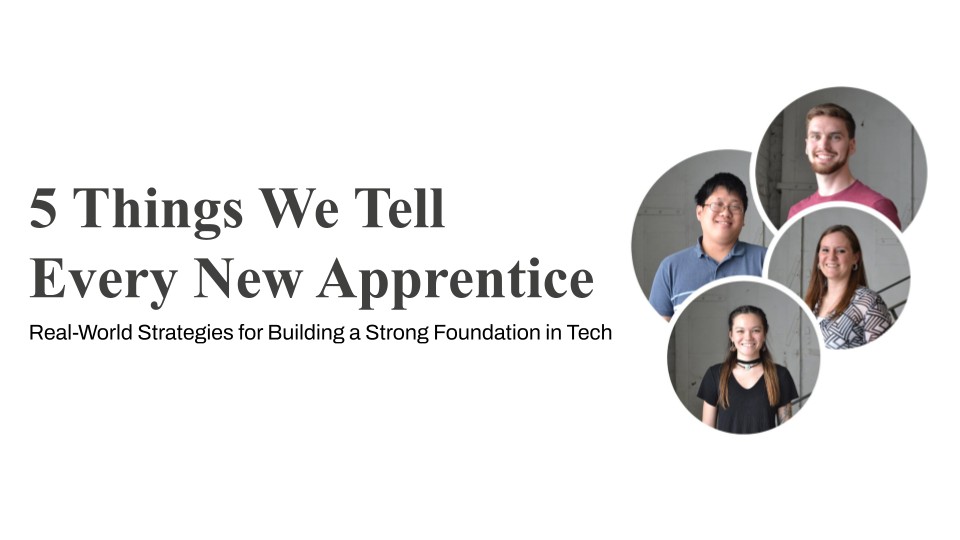Bridging the Internship Divide: Strategies for Equitable Access to Internships
A Conversation with a previous Internship Program Coordinator
By MAXX Potential
- Posted:
- Education, Internship

It’s no secret that an internship can be instrumental in fast-tracking a tech career. However, internships are hard to come by, and once you do have one, it’s not unusual to face hours of busy work rather than focusing on bringing value to the team’s project. Therefore, if you want an internship, you’re likely facing an uphill battle to find one.
“I went through an internship program between my junior and senior year at VCU, and then after graduating college I spent two years rotating through an IT Leadership Development program. As my career progressed a few years later, I found myself leading both the early career development and internship programs I was once a part of.” John Spauls, Integrator & Chief Operating Officer, understands the importance of an internship and where it can take you.
The Problems of Limited Availability and Inadequate Mentorship in Internships
Many students want an internship, and many are unable to find an internship that offers both experience and pay. In 2022, 21.5% of college students had an internship, which still means that nearly 80% did not. For those who don’t score an internship, they have to find other ways to build out their resume and score the career path of their dreams.
Limited Availability of Tech Internships
“There was always a challenge of finding managers who would take on the interns.” Spauls shared from his experience of running an internship program. “Interns were often inexperienced and needed a lot of handholding to help them start to return value.”
For Spauls, his previous company valued internships, setting a specific number for how many interns they’d take for each of their programs. It was up to him to find managers who would take on the interns. A lot of managers liked the idea of interns, but when reality hit, interns were often viewed as a burden.
In a paper published in 2019 about internships, students emphasized that the limited availability of internships had a lot to do with what field you were in. Some science students had no access to internships whereas business students had multiple options for internships. This problem becomes exacerbated with the fierce competition for the limited internships, where students from well-known universities often scored the role.
Expand Opportunities via Partnerships
When it comes to expanding an internship program within a company, the best push for it often comes from the leadership. That buy-in is the encouragement that many managers need to take on the responsibility of an internship.
“I always knew how many interns we would be bringing in for the summer. After we chose the number, I’d go out to find the project and the manager.” Spauls specified that because the number of interns came from leadership that he always had buy-in. “It was easy to say this is what the company wants – this is part of our talent pipeline to bring in people fresh out of college.”
Some other ideas to help with limited availability of internships include:
- Focus on the benefits of internship programs (talent recruitment, fresh perspective, etc.)
- Encourage collaboration between industry stakeholders
- Foster partnerships with educational institutions and employers to make internships a part of academic programs, ensuring practical experience
- Consider virtual internship opportunities to broaden access and allow skill building
Inadequate Mentorship of Interns
“You would give a manager two months’ heads up about their intern, and the day would arrive that the intern clocks in…and sometimes there’s no work for them to do.” Spauls recalled. “I would have the manager committed, but they didn’t prepare for the intern so that intern would just be twiddling their thumbs. It wasn’t always the best internship experience.”
Coffee runs, organizing paperwork, doing nothing – interns often find themselves doing menial tasks rather than participating in value-add activities that push a project forward. Individuals fresh from high school or college need some level of structured management, likely both a clearly-guided project and frequent check-ins. There’s an expectation that a manager is going to be both a mentor and coach to the intern. That isn’t always the case.
“A manager may be really good at helping their team prioritize different work items, hit deliverables, and be the first line of accountability, and that’s part of being an exceptional manager,” Spauls said. “But that manager is very used to working with experienced professionals who already know their technology. Put that same manager with a team of college interns, and they could get frustrated – college interns need additional guidance for the projects and professional environment.”
Interns often need some level of support and coaching from their manager and the professional team that they work with, and when they don’t get that, they face unclear learning expectations, limited work, and missed networking opportunities. The lack of support can impact the organization’s ability to tap into new ideas and achieve certain goals.
Select Experienced Professionals for Mentorship
“When I started running the internship program, I had my first taste of being both a manager and a coach.” Spauls commented, “Sure, we had interns who weren’t experienced with the technology, but I remember sitting down with an intern to discuss habit changes that would support having a 9 to 5 job.”
Interns needed guidance on the most basic soft skills expected in a professional environment. While some managers might have a knack for nurturing talent, not everyone does. One smart way to support the internship program is to provide training for managers who will have interns on their team.
“Our program had an onboarding orientation for the managers where we’d explain the process, assign interns, and share evaluation criteria. There wasn’t too much to it.” Spauls paused, “And then, it was up to the managers.”
Having managers who are trained to support interns is one step, but it doesn’t have to stop there. Other ways that could achieve the company goal of training new interns for a possible career at their company could include the following:
- Structured mentorship programs: a formal plan that includes regular check-ins with goal setting and opportunities for skill development
- Ongoing training for managers: resources to support mentorship development, including skills such as active listening, constructive feedback, and knowing what a supportive environment looks like
- Peer mentorship networks: interns can learn from one another and support each other through the internship experience, offering camaraderie, knowledge sharing, and community
A Public-Access Summer Internship Simulator Event
“The simulator solves the main problems that I saw running the internship program,” Spauls shared. “We already have a company, fake by name but real by deliverables, that takes interns through different types of roles within a company where they solve real world scenarios.”
The simulator is a repeatable process. We can quickly develop new scenarios to take cohorts through with a number of tasks to complete within a team setting. It’s online, so that alleviates any problems with getting to a location. We have the ability to create an unlimited number of meaningful internship experiences to serve internship needs with educational institutions.
“We have people on staff who are providing feedback, and they are trained to provide valuable insights so that each intern can improve and grow.” Spauls pointed out. “That’s what we do. We help people succeed when they don’t have this type of technology experience or understanding of a professional environment. It’s a tremendous opportunity that likely provides a better experience than probably a lot of corporate internships.”
Are you looking for a technology internship experience for a student or an adult? The MAXX public-access summer internship simulator is live now. Explore and register for the upcoming public sessions here.
MORE POSTS
Real-World Strategies for Building A Strong Foundation in Tech
MAXX Alumni Success Story with Cassidy Fuller, Business Systems Analyst III at Chicago Transit Authority
How to Maintain An In-Person Connection and Work From Home



